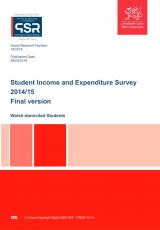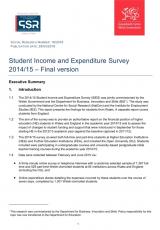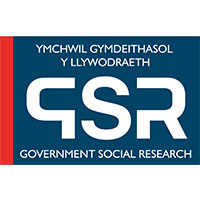A report showing data for earnings from work, income from family and friends, student spending, savings, borrowing and debts for September 2014 to August 2015.
This is not the latest release in the series: Student income and expenditure survey
Series information:
This final version includes comparisons between the financial position of Welsh-domiciled and English-domiciled students.
Full time students
- Average estimated income was just over £16,300, an increase of 43% compared to 2011/12, reflecting the expansion of the student support package to fund the higher fee regime introduced in 2012.
- Over half received a Welsh Government Learning Grant or Special Support Grant, and more did paid work during term time than in 2011/12.
- Family contributions made up a much lower proportion of income compared with the last survey.
- Average expenditure was just over £18,800 and had increased by 34% since 2011/12. Participation costs had more than doubled.
- Total borrowing averaged just under £7,300 following the first year, just below £15,000 following the second year and just over £19,000 following the third year.
- Whilst the use of commercial credit and arrears increased, although overall borrowing did not change between 2011/12 and 2014/15.
- Due to the Tuition Fee Grant, Welsh-domiciled full-time third year students had lower net debt (borrowing less savings, average £16,500) than English-domiciled students (whose net debt averaged £28,500).
Part-time students
- Average estimated income, at just below £14,000, had also increased since the last survey, but this margin of increase was less than for full-timers, and meant that unlike in 2011/12, part-timers’ income was lower than full-timers’.
- Most part-time students were in continuous paid work and most received social security benefits.
- First year students predicted they would end the year with just under £7,700 of borrowing. Those in their third and higher years of study predicted total borrowing of under £2,900. This borrowing included a substantial component of commercial debt, reliance on which had increased since the 2011/12 survey.
An infographic sets out some headline results. A detailed technical report will shortly be available in the UK Data Archive.
Reports

Student income and expenditure survey, September 2014 to August 2015 , file type: PDF, file size: 12 MB
PDF
12 MB
If you need a more accessible version of this document please email digital@gov.wales. Please tell us the format you need. If you use assistive technology please tell us what this is.

Student income and expenditure survey, September 2014 to August 2015: summary , file type: PDF, file size: 514 KB
PDF
514 KB
If you need a more accessible version of this document please email digital@gov.wales. Please tell us the format you need. If you use assistive technology please tell us what this is.

Student income and expenditure survey, September 2014 to August 2015: infographic , file type: PDF, file size: 555 KB
PDF
555 KB
If you need a more accessible version of this document please email digital@gov.wales. Please tell us the format you need. If you use assistive technology please tell us what this is.
Contact
Sara James
Telephone: 0300 025 6812
Rydym yn croesawu galwadau yn Gymraeg / We welcome calls in Welsh.

